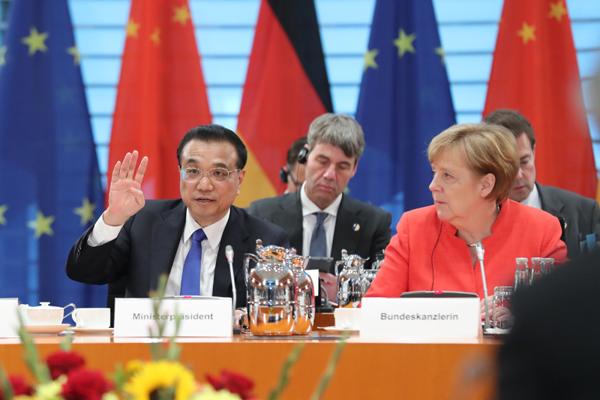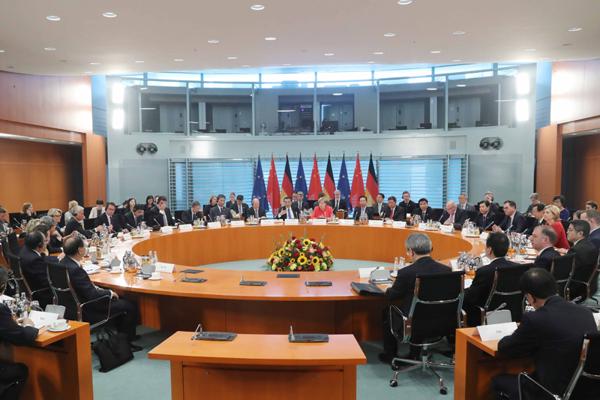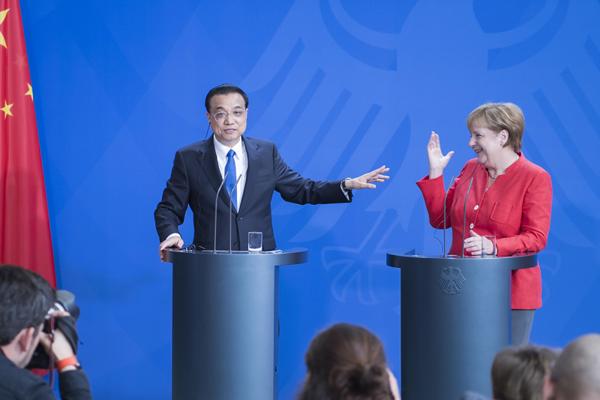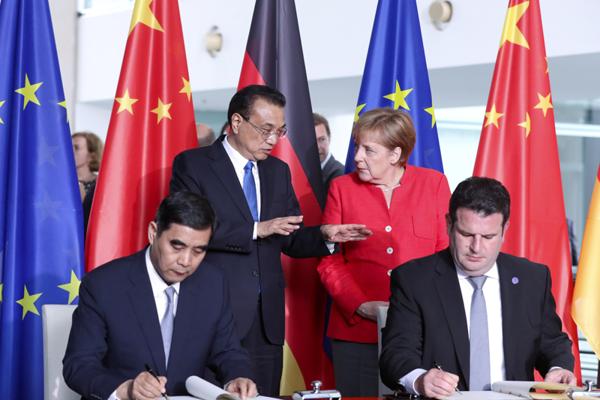On July 9, Premier Li Keqiang and German Chancellor Angela Merkel co-chaired the fifth round of intergovernmental consultations, attended by 22 heads of related departments from both sides, the strongest lineup since the mechanism was established.
“Six weeks ago I visited China, and now Premier Li, along with so many ministers, visited Germany, showing a close relationship between our two countries,” Merkel said.
China-Germany cooperation can be seen not only in intergovernmental consultations, but also in more than 70 dialogue mechanisms. Facing a world with uncertainties and complications, Germany is willing to strengthen cooperation with China, and send a positive signal of safeguarding multilateralism and carrying forward international cooperation to the world, Merkel added.
Premier Li said the two sides would like to expand win-win cooperation, take common responsibilities and safeguard multilateralism to benefit the two countries, the central Europe and the world.

Intensive negotiations before and during the consultations were held on a tight schedule, which yielded fruitful results.
After the consultations, Premier Li and Merkel witnessed the signing of more than 20 cooperative documents, in areas such as agriculture, education, youth, sanitation, chemicals, telecommunications, automotives and autonomous driving, totaling nearly $30 billion.
The growing trade volume has proved closer economic exchanges between the two countries, Merkel said.
Merkel said the two sides had a profound discussion in investment and other areas. “The memorandum of understanding on cooperation in autonomous driving was of great significance to the future development in this field,” she added.
Premier Li said China’s huge market in autonomous driving will offer many opportunities to German enterprises, expressing his hope that Germany would give support in this respect.

Among the documents, two cooperation agreements were reached between the two countries. German chemical company BASF will establish a foundation for the integration of fine chemicals in Zhanjiang, Guangdong province, the first foreign wholly owned company in China’s chemical industry. Also, the automotive company BMW will hold more than 50 percent of shares in its Chinese joint ventures, the first of its kind in China.
China’s continuous opening-up this year is to maintain its economy with stable and good momentum, while sending signals opposing trade protectionism, and Germany just grasps the chance, said Premier Li.
Merkel said she is glad to see China’s opening-up in various industries, which showed that China is doing what it has promised, not just saying it.

In this fifth round of intergovernmental consultations, opening-up has been the major topic for Chinese ministers. According to them, China is advancing a new round of high-level opening-up. This includes a newly released negative list for foreign investment as well as further lifting restrictions on the finance, automotive and infrastructure industries. The country will work out a detailed timetable for the pre-establishment national treatment plus negative list management mode in financial sectors.

In a response to a reporter’s question on free trade, Merkel said a clear message on supporting multilateral and international cooperation should be released under the current complicated global situation.
“We reached a consensus on following WTO rules and safeguarding multilateralism and multilateral trade,” said Merkel.
Premier Li stressed that with rising unilateralism and trade protectionism, the fruitful cooperation results reached between China and Germany proved that free trade will give a strong boost to the economic recovery of both countries, and even the whole world.
“Market segmentation and unilateralism do not conform to our principles, and are neither in line with our expected future nor the progress of human civilization,” said the Premier, adding that trade cooperation between China and Germany is bilateral, and it will not target or be influenced by a third party.
“We hope all the bilateral, trilateral and multilateral cooperation will not target or affect any other party,” he said.
